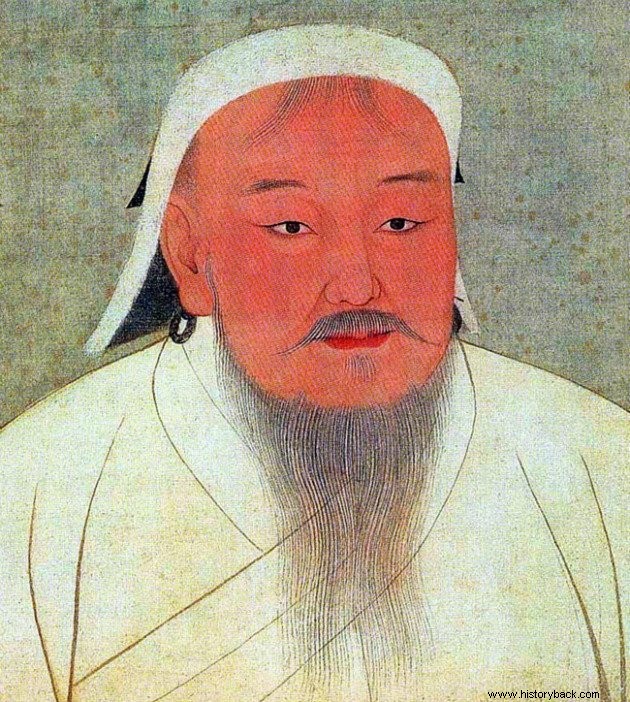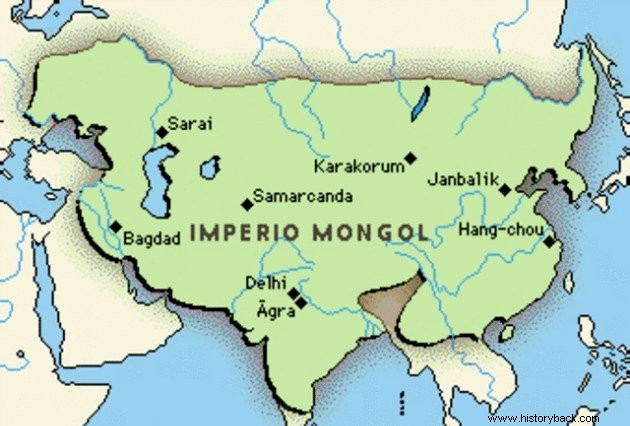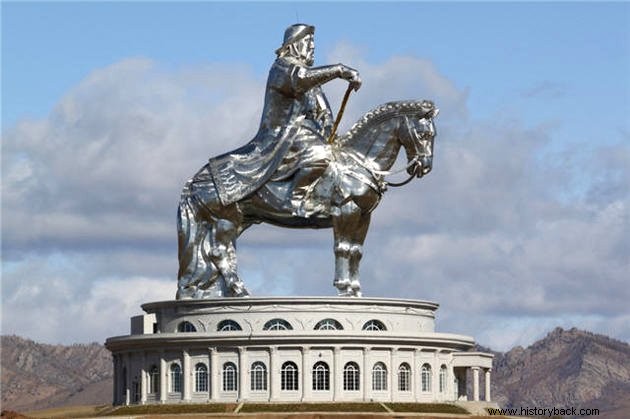Genghis Khan was a Mongolian warrior and politician who expanded his territory from Asia to Europe.
Legend has made the sovereign the very synonym of the bloodthirsty despot, merciless murderer, but who must also be remembered for the feat of unifying the Mongols.
His name can be engraved as both Genghis Khan and Genghis Khan.
Biography

Genghis Khan was born in Mongolia in the year 1162. Son of Iasugai, chief of the Kiyata-Borjigin tribe, his real name was Temujin. He was orphaned at the age of thirteen and found himself abandoned by the tribes that obeyed his father.
In 1179, Temujin marries Borte, to whom he has been betrothed since the age of nine. Around 1189, the tribe of Merkites sacked the Borjigin clan's camp and took the wife of its illustrious member.
The outraged husband decided to take revenge, made an alliance with another tribe, threw himself into the fight and won. He took back his wife, gained prestige and was named head of the tribe.
He also changed his name from Temujin to Genghis , which in Mongolian means perfect warrior .
In 1192, Genghis attacked and defeated the Tartars. He gained the sympathy of the Chin dynasty that reigned in Northern China, that is, south of the Mongol lands and which was also threatened by the Tatars.
Little by little all the Mongol tribes were subdued, Genghis decided to legalize his power. In 1206 he assembled a great kurultai - general assembly of the noble families of these tribes - who proclaimed him supreme chief , Khan .
Genghis Khan felt himself to be carrying out a divine mission "One sun in the sky, one sole ruler on earth ", he used to say about himself.
He transformed the Mongols' military force into a veritable national army. He brought together the law codes of the different tribes in a single constitution, the Jasak . And he thought the time for expansion had come.
See also:MongoliaMilitary Achievements

The first goal, said Genghis Khan, was to "spit to the South", that is, to attack China. The Great Wall barred their way.
The fighting began in 1211, the Mongols ravaging the countryside of China, the Chinese resisting inside the fortified cities.
The soldiers were divided into three armies, which attacked at different points, breaking the Chinese defense lines.
Killing and looting, they conquered northern China after two years, carrying the imperial treasures. Beijing stayed out of the conquest, but for a short time.
In 1215, he launched a new expedition against Peking, the Chinese Emperor himself fled and destroyed the city, leaving six trusted generals there.
In 1218 he conquered Tajikistan, and the following year, Persia. Between one victory and another Genghis Khan founded the city of Karakorum, which would become the capital of his immense possessions.
Until then Genghis Khan had limited his ambitions to East Asia. In 1219 he began his crossing of the great mountain ranges that isolated the peoples of Central and East Asia from the civilizations of West Asia.
Kwarizam (which today corresponds to Iran and Afghanistan) was taken by surprise. Then he went to other Muslim centers such as Otrar, Bokhara, Samarkand, Merv, Nichapur and Herat.
See also:ChinaInheritance
Genghis Khan was the greatest ruler of his time and controlled a territory where different ethnicities and religions coexisted. He became the sole lord of an empire that stretched from China to the Persian Gulf, from the icy deserts of Siberia to Indian forests.
However, during his military campaigns he killed millions of Muslims, Christians and Buddhists.
In 1221, Genghis Khan returns to Mongolia. On August 18, 1227, after a battle in South Asia, Genghis Khan died at the age of 66 at the height of his power. Even today it is not known whether he was wounded during the war, fell ill or was even poisoned by some palace intrigue.
In an undetermined place, next to the sacred mountains of the Borjigin, the Oceanic Emperor was buried.
His titles were:Overlord of the Mongols, Great Slayer, Perfect Warrior, Lord of Thrones and Crowns, Emperor of All Men – and of course, Genghis Khan.
The expansion of the Mongol Empire continued during the reign of his son Ögedei. The territory remained intact until the accession of his grandson, Kublai Khan, who was the first non-Chinese emperor to reign in China.
However, internal disagreements ended up dividing and weakening the Empire founded by Genghis Khan.
Curiosities

- It is likely that Genghis Khan has had few baths in his life. The Mongols believed that washing in rivers would irritate dragons with filth. That's why they didn't wash themselves and they didn't wash their clothes either.
- Genghis Khan is estimated to be the biological father of 5% of the Asian population.
- Relentless with his enemies, Genghis Khan invaded and arrested the governor of a city who had robbed and killed his emissaries. When he arrived in the city, he had him killed by throwing molten silver into his eyes and mouth. This method was recovered in one of the episodes of the series Game of Thrones .
- Genghis Khan won in 2008 a tribute to the height of his achievements:an equestrian statue 40 meters high and 250 tons of weight made of stainless steel.
Sentences
- I am a punishment from God. And if you didn't commit great sins, God wouldn't have sent a punishment like me.
- If you're afraid don't do it, if you're doing it don't be afraid!
- Without the vision of a goal a man cannot manage his own life, let alone the lives of others.
- Man's pleasure and joy consists in crushing the rebel and conquering the enemy, in uprooting him and taking from him all that he belongs to.
Movies
- The Warrior Genghis Khan, Sergei Brodov . 2007.
- Genghis Khan, Andrei Borissov . 2009.
- Genghis Khan – Emperor of Fear, Shinichirô Sawai . 2007
- Genghis Khan, Ken Annakin .1992.
- Genghis Khan. Henry Levin . 1965.
Read more:
- Asia
- Middle Ages
- Middle East
- Barbarian Peoples
- Islamism
